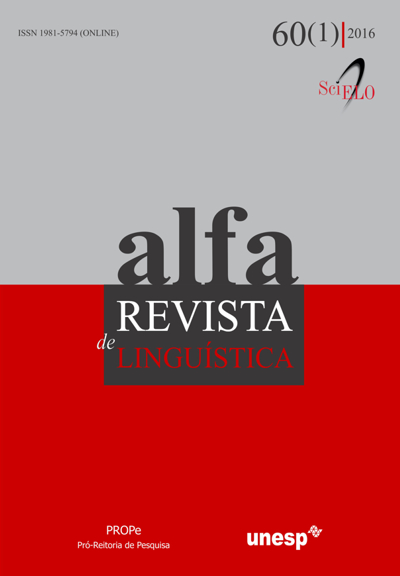Cartographies of Languages: Glossaries for books of literature
DOI:
https://doi.org/10.1590/1981-5794-1604-4Keywords:
Language, Glossary, History of Linguistic Ideas,Abstract
With this article we aim to contribute to the understanding of how glossaries function. In this work we consider glossaries produced for books of literature and we use the History of Linguistic Ideas in conjunction with Discourse Analysis as theoretical support. This article is a reflection on glossaries for books of literature, focusing on those produced from the position of the writer and which show some of the writers marks.It is proposed that these glossaries work as meta-linguistic texts, that they influence the author’s writing, and that they also work as an additional commentary about language which writing never run’s out. Next, differences between the production of glossaries created from the position of the writer and from the position of the editor are shown, highlighting the way the two types of glossaries function. To elaborate on the second type of glossary, four books written in the Portuguese language by an African writer are analyzed. Some of the conclusions reached here are: although they are based on the illusion of making the text clearer, glossaries contain a position on language that reveals tensions in the language. Furthermore, it is possible to understand them as an instrument of grammatization of the Portuguese language in African countries as well as an instrument of grammatization of African languages in African territory.Downloads
Download data is not yet available.
Downloads
Published
25/04/2016
How to Cite
MEDEIROS, V. Cartographies of Languages: Glossaries for books of literature. ALFA: Revista de Linguística, São Paulo, v. 60, n. 1, 2016. DOI: 10.1590/1981-5794-1604-4. Disponível em: https://periodicos.fclar.unesp.br/alfa/article/view/7626. Acesso em: 3 feb. 2026.
Issue
Section
Papers
License
Manuscripts accepted for publication and published are property of Alfa: Revista de Linguística. It is forbidden the full or partial submission of the manuscript to any other journal. Authors are solely responsible for the article's content. Translation into another language without written permission from the Editor advised by the Editorial Board is prohibited.

